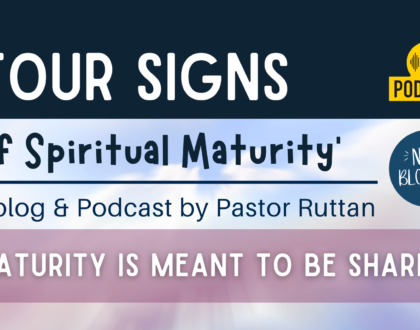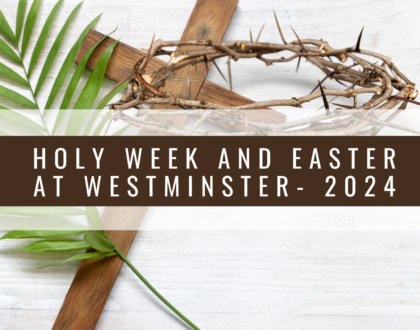6 Popular Questions About Easter (and the answers)
by Westminster
How do a magical bunny, the names “Maundy” and “Good Friday,” and the death of an innocent man all come together?
These questions often arise this time of year so I’ve put them together in a blog.
1. Why does the date always change?
 Christmas is a fixed day. But Easter is based on the Paschal Full Moon. Since it’s based on the lunar schedule it fluctuates. But it’s always between March 21 and April 25.
Christmas is a fixed day. But Easter is based on the Paschal Full Moon. Since it’s based on the lunar schedule it fluctuates. But it’s always between March 21 and April 25.
2. What does the word “Easter” mean?
Some word-origin dictionaries trace it through various languages meaning different spring-ish things. According to another person it is connected to an old Anglo-Saxon spring or fertility goddess called “Eostre”; and as Christianity grew in prominence it took over the name for it’s own spring-time celebration.
In short, it’s hard to be sure. Now we just use the word Easter to refer to the celebration of Jesus’ suffering, crucifixion and resurrection.
3. What is the religious significance?
For Christians, the cross is the main event. (That’s why so many of us wear crosses around our necks—to remind us of this fact.) So at Easter, we honour the death and coming-back-to-life of our name sake: Christ.
The fact that he comes back to life has many meanings. One is that it’s God’s way of showing his perfection and innocence, and that he is who he said he was. Given that fact, Christ-ians follow his life, example and words very closely: What God’s Son says goes.
What God's Son says goes.
— Matthew Ruttan (@MatthewRuttan) March 28, 2015
As Stephen Seamands writes, “To be a Christian is to believe and confess that Jesus is alive.” For Jesus’ followers, he’s not just a historical figure, he’s a now-ruling King.
#Jesus is not just a historical figure, he’s a now-ruling King.
— Matthew Ruttan (@MatthewRuttan) March 28, 2015
4. What’s with the names “Maundy Thursday” and “Good Friday”?
That’s right: Maundy, not Monday. It’s the Thursday before Easter and is from the Latin translation of Jesus’ words in John’s Gospel, chapter 13, verse 34: “Mandatum novum,” meaning “new commandment.” Here’s the full verse: “A new command I give you: Love one another. As I have loved you, so you must love one another.”
"A new command I give you: #Love one another. As I have loved you, so you must love one another." #Jesus
— Matthew Ruttan (@MatthewRuttan) March 28, 2015
Good Friday is the day Jesus was executed on the cross. (I blogged more about what the crucifixion was like here.) As I was recently asked, “Shouldn’t it be called Sad Friday?”
One explanation is that the word “good” comes from “God,” so it’s really “God’s Friday.” Another is that on that day Jesus paid the penalty for humanity’s sins. So since he took upon himself what we deserve, it is a day that delivers good news for those who accept this gift.
Good Friday is also the day you’ll sometimes see people having cross parades through the streets.
5. How do the Easter bunny and eggs fit into all this?
Okay, so I had no previous knowledge about this one. So I did some digging!
It seems the first records of an Easter bunny are from the 1500’s. Some sources trace it’s passage to North America from German immigrants who had traditions of a bunny (and sometimes, a man!) who left eggs for good kids the night before Easter Sunday.
Notice the similarity to Christmas: goods are left on the night before the holiday, and only for well-behaved children. The good behaviour part has kind of dropped. (And although we give lip service to Santa only bringing presents to well-behaved kids at Christmas, let’s face it, it’s pretty much gone there too.)
Since bunnies seem to reproduce themselves at astronomical rates they are symbols of fertility and spring. Eggs also symbolize new life. Put them together and poof! Bunny delivering egg-ish goodness.
(I should say that some people, including myself, use cracked-open eggs to symbolize the empty tomb; but it didn’t start there.)
So how do the Easter bunny and eggs fit into all this? They don’t really, at least not in a perfectly fitting way. But we’ve always been good at finding reasons to mow down on sweets during a holiday!
6. “Why did Jesus have to die?”
In Denver, a customer asked a worker at a department store, “Do you sell gold crosses?” “What kind would you like?” the clerk replied. “A plain one or one that has the little man on it?”
The clerk didn’t know who the person on the cross was. We live in a time of increasing confusion about who Jesus was and is—and this includes how the cross (an ancient form of execution) fits into the story.
Yes, it’s a tough one. The ancient Romans torture and crucify an innocent man who was perceived as a rival king and revolutionary. And then he rises from the dead three days later. A miracle!
Martin Luther King Jr. questioned the bodily resurrection of Jesus when he was 13. He grew, made his faith his own, and later affirmed this great event. But I say this just to highlight that it’s something many people wrestle with.
Jesus’ death has many meanings—like holding up a many-sided diamond in the sun and watching the light cascade in different directions. But here’s one of the biggest:
God is just. And we are broken, sinful people. (If you’re not used to this language that might seem harsh; but stick with me.)
If you’re honest, you know you’re broken, and that you haven’t fulfilled God’s greatest command (to love him and others with everything you’ve got). A single lustful thought is like adultery. Ever wish you had something someone else had? That’s coveting. Ever looked the other way of someone’s plight? Ever known the right thing to do but didn’t do it? Yup, that counts too.
All of it is breaking God’s law. And since he is perfectly just, there needs to be justice, payment. You’re too small; you can’t do it. The “great reversal” is Jesus taking on all our wrongdoing upon himself. (Remember Good Friday?) Because of his love and our trust in him, the reversal happens: Jesus takes our sin upon himself—and when we stand before God, he doesn’t see our meager record, but Jesus’ perfection. There’s been a reversal. Talk about a wonderful gift!
If you think it’s unfair that God pours his wrath on an innocent 3rd party, here’s the rub. He didn’t. Jesus is God walking among us. And so it’s God taking our punishment upon himself.
Jesus didn’t have to die. He chose to. As I saw on a church sign (and as my brother Deric sings in one of his songs), nails did not keep Jesus on the cross: love did.
"Nails did not keep him on the #cross. #Love did" @DericRuttan #Easter
— Matthew Ruttan (@MatthewRuttan) March 28, 2015
And he did it for you and me.
(For some help speaking to small kids about why Jesus died you can read a blog I did about that here.)
Despite popular belief, the purpose of life isn’t to wait it out and get to heaven. There’s more. God is in the midst of making “a new heavens and a new earth.” This is a New Order, and Jesus’ triumph over death is the sign that death is no longer the boss, and that this New Order is starting… in him. It’s a foreshadowing of something we can all be a part of.
Maybe it’s strange to end with a quote from Friedrich Nietzsche, but it’s pretty good: “Only where graves are is there resurrection.”
Yes, death is a part of life. But not eternal life.
Yes, death is a part of life. But not eternal life. #Easter #easterholidays
— Matthew Ruttan (@MatthewRuttan) March 28, 2015
Happy Easter!
Recommended Posts

10 Unpopular things Jesus said
July 23, 2024

Four Signs of Spiritual Maturity
April 25, 2024

Holy Week and Easter at Westminster – 2024
March 09, 2024